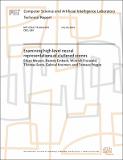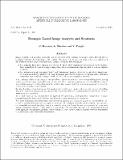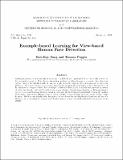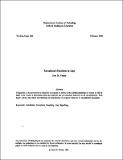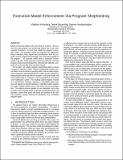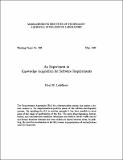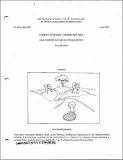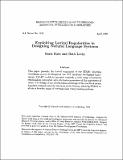Browsing Computer Science and Artificial Intelligence Lab (CSAIL) by Title
Now showing items 1155-1174 of 3804
-
Examining high level neural representations of cluttered scenes
(2010-07-29)Humans and other primates can rapidly categorize objects even when they are embedded in complex visual scenes (Thorpe et al., 1996; Fabre-Thorpe et al., 1998). Studies by Serre et al., 2007 have shown that the ability of ... -
Examining Key Mobility Resources through Denial of Service Attacks on proposed Global Name Resolution Services
(2016-09-26)The problem we address in this thesis is to uncover the design elements in a network architecture design that may open it up to denial of service (DoS) attacks and to expose the tradeoffs in mitigating those DoS opportunities. ... -
Example Based Image Analysis and Synthesis
(1993-11-01)Image analysis and graphics synthesis can be achieved with learning techniques using directly image examples without physically-based, 3D models. In our technique: -- the mapping from novel images to a vector of "pose" ... -
Example Based Learning for View-Based Human Face Detection
(1995-01-24)We present an example-based learning approach for locating vertical frontal views of human faces in complex scenes. The technique models the distribution of human face patterns by means of a few view-based "face'' and ... -
Example-Based Control of Human Motion
(2004-07-01)In human motion control applications, the mapping between a control specification and an appropriate target motion often defies an explicit encoding. We present a method that allows such a mapping to be defined by example, ... -
Exceptional Situations in Lisp
(MIT Artificial Intelligence Laboratory, 1985-02)Frequently, it is convenient to describe a program in terms of the normal situations in which it will be used, even if such a description does not describe the its complete behavior in all circumstances. This paper surveys ... -
Executing Multithreaded Programs Efficiently
(1995-09)This thesis presents the theory, design, and implementation of Cilk (pronounced "silk") and Cilk-NOW. Cilk is a C-based language and portable runtime system for programming and executing multithreaded parallel programs. ... -
Execution Model Enforcement Via Program Shepherding
(2003-05)Nearly all security attacks have one thing in common: they coerce the target program into performing actions that it was never intended to perform. In short, they violate the program's execution model. The execution model ... -
Experience with Acore: Implementing GHC with Actors
(1990-08-01)This paper presents a concurrent interpreter for a general-purpose concurrent logic programming language, Guarded Horn Clauses (GHC). Unlike typical implementations of GHC in logic programming languages, the interpreter ... -
Experience with Fine-grain Synchronization in MIMD Machines for Preconditioned Conjugate Gradient
(1992-10)This paper discusses our experience with fine-grain synchronization for the preconditioned conjugate gradient method using the modified incomplete Cholesky factorization of the coefficient matrix as a preconditioner. This ... -
An Experiment in Knowledge Acquisition for Software Requirements
(MIT Artificial Intelligence Laboratory, 1990-05)The Requirements Apprentice (RA) is a demonstration system that assists a human analyst in the requirements-acquisition phase of the software-development process. By applying the RA to another example it has been possible ... -
An Experimental Analysis of Program Reference Patterns in the Multics Virtual Memory
(1974-05)This thesis reports the design, conducting, and results of an experiment intended to measure the paging rate of a virtual memory computer system as a function of paging memory size. This experiment, conducted on the Multics ... -
Experimental Markets for Product Concepts
(2001-07-01)Market prices are well known to efficiently collect and aggregate diverse information regarding the value of commodities and assets. The role of markets has been particularly suitable to pricing financial securities. This ... -
Experimental Study of Minimum Cut Algorithms
(1997-05)Recently, several new algorithms have been developed for the minimum cut problem that substantially improve worst-case time bounds for the problem. These algorithms are very different from the earlier ones and from each ... -
An Expert System for Diagnosing Gait for Cerebral Palsy Patients
(1987-05)Many first generation expert systems in medicine assumed that a single fault was the cause of the patient's problems. However, this is not always so and in the domain of gait analysis this is usually not the case. This ... -
Expert Systems: Where Are We? And Where Do We Go from Here?
(1982-06-01)Work on Expert Systems has received extensive attention recently, prompting growing interest in a range of environments. Much has been made of the basic concept and the rule-based system approach typically used to ... -
Explanation of Big "P" as of March 20, 1959
(1959-03-01)ERROR is a routine to provide a common location for all routines. Its celling sequence is: SXD SERROR,4 TSX SERROR+1,4 The above is normally followed immediately by up to 20 registers of BCD remarks terminated by a word ... -
Explicit Control of Reasoning
(1977-06-01)The construction of expert problem-solving systems requires the development of techniques for using modular representations of knowledge without encountering combinatorial explosions in the solution effort. This report ... -
Exploiting Lexical Regularities in Designing Natural Language Systems
(1988-04-01)This paper presents the lexical component of the START Question Answering system developed at the MIT Artificial Intelligence Laboratory. START is able to interpret correctly a wide range of semantic relationships associated ...

